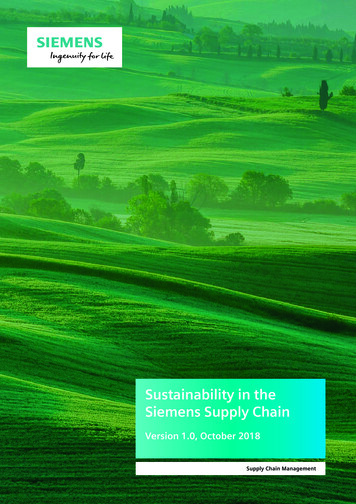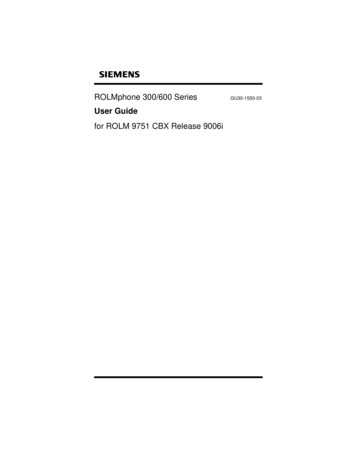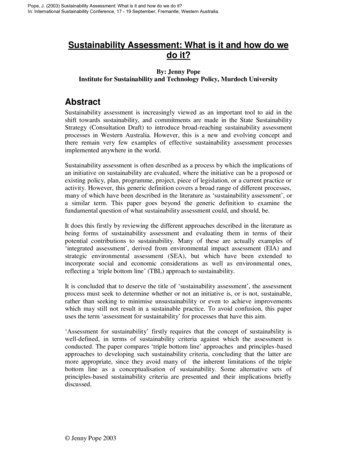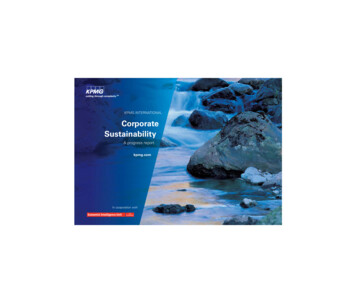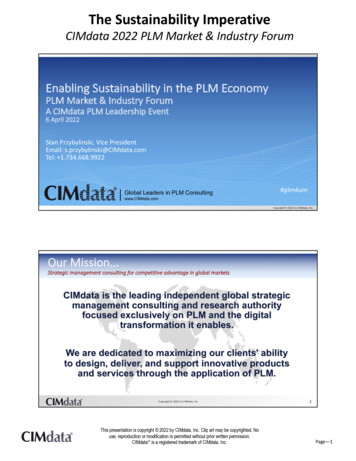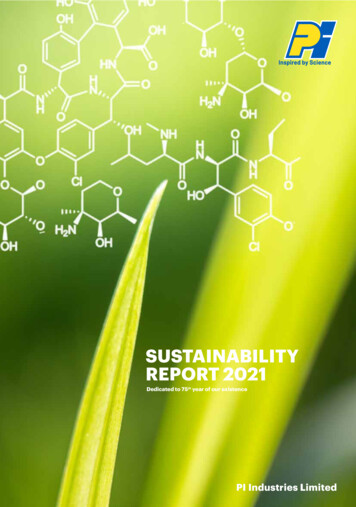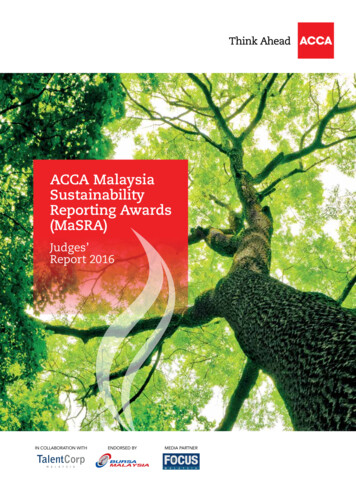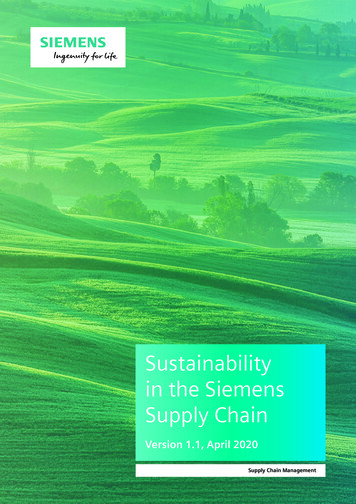
Transcription
Sustainabilityin the SiemensSupply ChainVersion 1.1, April 2020Supply Chain Management
““As soon as a company transferssome of its reputational risk,corporate social responsibilityand environmental impact elsewhere, it must tackle SupplyChain Management as one of itsmost pressing concerns.Dr. Klaus StaubitzerChief Procurement Officer
ContentsChapter 1:4Chapter 2:5Chapter 3:6Chapter 4:7Chapter 5:8Chapter 6:9Chapter 7:13Chapter 8:14Chapter 9:15Siemens Values and Legal RequirementsCode of Conduct for Siemens SuppliersRisk AwarenessData TransparencySuppliers‘ Ready-for-BusinessRisk ExposureRisk DetectionConsequencesCompany‘s ResponsibilitySustainability in the Siemens Supply ChainSupply Chain Management
Chapter 1Siemens Values andLegal RequirementsSiemens’ sustainability initiatives are an essential aspect of successfully implementing the Siemens Strategy ProgramVision 2020 . Our understanding of sustainability is fully based on our company values – responsible, excellent,innovative. At Siemens, we define sustainable development as the means to achieve profitable and long-term growth.In doing so, we align ourselves with the goals of the UN’s 2030 Agenda for Sustainable Development and the OECDGuidelines for Multinational Enterprises.According to the UN Global Compact, the “supply chaincan make a significant impact in promoting human rights,fair labor practices, environmental progress and anticorruption policies”. Some of the biggest contributions canbe made on the United Nations Sustainable DevelopmentGoals (SDG), especially regarding SDG 8 on Decent Workand Economic Growth, which among other things addresseslabor issues, and SDG 12 on Responsible Consumptionand Production. SDG 12 specifically calls on companies towork to adopt sustainable practices and increase reportingon their progress too. Efforts can be made to address poorworking conditions, ranging from minimum wage violationsto extreme occupational hazards, and eradicate all formsof forced labor and child labor. Unhealthy workplaces can becleaned up.Some examples:Siemens’ purchasing volume equals roughly half of ourtotal revenue from some 90,000 suppliers in around150 countries. This brings an enormous responsibilityensuring Human Rights, Employees’ Health & Safety andEnvironmental Protection at all our suppliers worldwideas we claim: “We only do business with clean partners”.Siemens Supply Chain Management (SCM) has to ensurethat Siemens meets all these requirements. SCM thereforehas implemented various procurement processes.This Sustainability in the Siemens Supply Chain Brochureshall internally help to understand and fulfill all sustainabilityrequirements within the business relations with our suppliers.Externally, it shall inform our stakeholders on our SupplyChain Sustainability efforts. European Union: Regulation concerning the Registration,Evaluation, Authorization and Restriction of Chemicals(REACh), Regulation concerning Restriction of HazardousSubstances (RoHS), Timber Regulation, F-Gases Regulation,Conflict Minerals Regulation United States of America: Dodd-Frank Act, Sec 1502“Conflict Minerals”, California Transparency in SupplyChains Act of 2010, Business Supply Chain Transparencyon Trafficking and Slavery Act of 2015 Germany: Requirements out of the National Action Planon ensuring Human Rights in the Supply Chain United Kingdom: Modern Slavery Act 2015 France: Loi de VigilanceWithin the recent years numerous pieces of legislationwere published and require our absolute attention.Besides others, EU law on environmental protection andhuman rights came into effect as well as legislation in USA,UK, France, Denmark, Australia, and Germany.Sustainability in the Siemens Supply Chain4Siemens Values and Legal Requirements
Chapter 2Code of Conduct forSiemens SuppliersThe “Siemens Group Code of Conduct for Suppliers and Third Party Intermediaries” and thereon based company-wide,mandatory requirements and processes ensure the effective establishment of the specified environmental, complianceand labor standards across all countries of operations.The Code of Conduct commitment processes for suppliersare Siemens-wide mandatory:The Code of Conduct covers the following requirements:– Human Rights and Labor Practices, including (beside others) Prohibition of Forced Labor, Prohibition of Child Labor, Health & Safety for Employees Grievance Mechanism To become “Ready-for-Business” all new suppliers have tocommit to the Code of Conduct. The commitment mustbe given during the supplier’s registration process in ourglobal procurement application SCM STAR. All new and extended procurement contracts have toinclude the Code of Conduct commitment, a paragraphon Supplier Self-Assessment and Audit-right and aspecific termination clause in case of major breach of ourCode of Conduct requirements. All worldwide available Siemens Conditions of Purchasehave to include the principles of the Code of Conduct.– Environmental Protection– Fair Operating Practices, including (beside others) Anti-Corruption and Bribery Anti-Money Laundering, Terrorism Financing Data PrivacySiemens requires all its suppliers to promote theimplementation of the requirements of the Code ofConduct in their own supply chain.– Responsible Minerals Sourcing– Compliance to Code of Conduct in own supply chainAs companies are facing the challenge of complying with amultitude of different environmental and labor standards,we intend to avoid a „code mania“ and we are striving toreduce the duplication of efforts at suppliers and customerswhile maintaining our high environmental and labor standards.We have, therefore, introduced a corporate managedprocedure for accepting industry-specific codes asequivalent to the requirements of our Code of Conduct, aswell as those of suppliers and associations, when theirrequirements comply with our own requirements.Sustainability in the Siemens Supply Chain5Code of Conduct for Siemens Suppliers
Chapter 3Risk AwarenessSiemens has implemented a system of interconnected processes and tools to ensure full transparencyand awareness for our purchases and for our supply chain risks & opportunities. It is important notonly to implement “stand-alone” processes for different risk areas but to develop a comprehensivesystem covering all Code of Conduct requirements. This, however, is a lengthy and continuous processwhich – step-by-step – adds new elements. We are working constantly on improving our Sustainabilityin the Supply Chain processes by considering the highly diverse and complex requirements by laws,customers, stakeholders and NGOs.Critical suppliers can be identified in various ways. We have implemented processes to cover supplierrisks according to our Code of Conduct categories. This provides a clear structure and walks us throughall legislative requirements we must meet in the different regions we procure.Examples for specific risk categories are suppliers: based in higher risk countriesfalling under general supplier quality management aspectswith high purchasing volumethat are requested from customerswith forced and compulsory labor risks and risk for child laborwith health and safety risks, mainly working in building business (“contractors”)providing products falling under the REACh / RoHS legislationproviding products or services with a high carbon footprintproviding products relevant concerning responsible mineral sourcingSustainability in the Siemens Supply Chain6Risk Awareness
Chapter 4Data TransparencyData transparency is a prerequisite for all procurement activities and a must for fulfilling sustainability requirements in thesupply chain and its legal obligations.Our Siemens-wide implemented procurement applications “SCM STAR” (STrategy And Realization) and “SCM CoRe”(Controlling and Reporting) provide all Siemens procurement data centrally. Based on the supplier’s risk categorization allrelevant suppliers in one or more critical groups can therefore be identified.In order to systematically leverage the potential of the procurement function in terms of opportunity and risk managementacross all our businesses and regions, standardized extraction and central provision of all procurement-relevant informationis crucial. For this purpose, all relevant procurement information is administered in a central database where the data isaggregated and made available to individual users (Controllers, Buyers, Commodity Managers, Purchasing Councils, ProjectProcurement Managers).SCM STAR is a cloud-based Siemens procurement applicationintegrating areas of Supplier Management, ContractManagement and Sourcing where all employees withprocurement responsibilities have access to. SCM STAR hasthe following benefits:SCMCoRe contains – amongst others – following data on allpurchases of goods and services: Supplier information (incl. registered name, address andcountry) Identifier for Account (IfA): Internal unique identificationnumber for suppliers Commodity Code (ESN): Internal 3-digit ESN classificationkey for all purchased goods and services Purchasing Volume Reduced complexity of processes based on marketstandards Transparency and end-to-end coverage of Source-toContract (S2C) processes One single S2C cockpit for buyer and supplier interaction Modular and integrative solutionThis system includes all necessary information for strategic procurement and our supplier management processes, such asqualification, evaluation, risk & opportunity management as well as development of suppliers. In addition, it also providesfunctions for electronic information exchange with suppliers including the Corporate Responsibility Self-Assessment.Sustainability in the Siemens Supply Chain7Data Transparency
Chapter 5Suppliers‘Ready-for-BusinessWe have implemented a mandatory, Siemens-wide Supplier Management Process to ensure that wecollaborate with the best suppliers. All relevant aspects in relation to procurement, quality, logisticsand technology have to be considered, as well as strategy, innovation, potential and risks.Innovations and potential procurement options are monitored regularly along with important marketand technology trends.Especially at the beginning of a potential collaboration with a supplier it is important to verifysuppliers’ commitment in order to act in the sense of our values and according to our requirements.Therefore, suppliers nominated on basis of preselection must clearly provide a commitment of theirobligation to fulfill all minimum requirements. This includes the suppliers‘ agreement to abide bythe Siemens Code of Conduct. Additionally, within the Supplier Qualification process, suppliers haveto fulfill various requirements depending on defined triggers, e.g. country of location or kind ofdelivered products and services.Only if the supplier has successfully completed the registration and qualification processes, it isassigned with the status “Ready-for-Business” (R4B) and can be utilized by Siemens buyers.Sustainability in the Siemens Supply Chain8Suppliers‘ Ready-for-Business
Chapter 6Risk ExposureWith such a large and geographically dispersed supplier network, Siemens cannot maintain the same level of oversight forevery supplier with reasonable effort. For example, it would be impossible to perform site audits everywhere. Therefore, wehave established risk analysis procedures for all risk categories to systematically identify potential risk suppliers within eachcommodity or country. In doing so, we implemented risk based processes to secure our supply chain’s sustainability risks.Additionally, other processes within SCM, Compliance, Environment, Health & Safety or on regional level are in place for veryspecific internal topics or legislative demands.Suppliers based in higher risk countries –Corporate Responsibility Self-AssessmentWhen based in a higher risk country, the supplier hasto pass a Sustainability Self-Assessment in order tobecome a Siemens supplier. The more detailed processis described under Chapter “Risk Detection – CorporateResponsible Self-Assessment”.Siemens Group Code of ConductEnvironmental Protection for Suppliers and Third Party Intermediaries This Code of Conduct defines the basic requirements placed on the suppliers and third partyintermediaries of the Siemens Group concerning their responsibilities towards their stakeholdersand the environment. The supplier and/or third party intermediary declares herewith to: Anti-Corruption and Bribery Tolerate no form of and do not engage directly or indirectly in any form of corruption or briberyand do not grant, offer or promise anything of value to a government official or to a counterpartyin the private sector to influence official action or obtain an improper advantage. This includes torenounce from giving or accepting improper facilitation payments.Legal Compliance Comply with the laws and regulations of the applicable legal systems.Human Rights and Labor Practices Fair Competition, Anti-Trust Laws and Intellectual Property Rights Act in accordance with national and international competition laws and do not participate in pricefixing, market or customer allocation, market sharing or bid rigging with competitors. Respect the intellectual property rights of others.To ensure respect of all internationally proclaimed human rights by avoiding causation of and complicityin any human rights violations, heightened attention shall be paid to ensuring respect of human rights ofspecifically vulnerable rights holders or groups of rights holders such as women, children or migrantworkers, or of (indigenous) communities. Prohibition of Forced Labor Neither use nor contribute to slavery, servitude, forced or compulsory labor and human trafficking. Conflicts of Interest Avoid and/or disclose internally and to Siemens all conflicts of interest that may influencebusiness relationships, and to avoid already the appearance thereof. Prohibition of Child Labor Employ no workers under the age of 15 or, in those countries subject to the developing country Anti-Money Laundering, Terrorism Financing Not directly or indirectly facilitate money laundering or terrorism financing. exception of the ILO Convention 138, employ no workers under the age of 14.Employ no workers under the age of 18 for hazardous work according to ILO Convention 182. Data Privacy Process personal data confidentially and responsibly, respect everyone’s privacy and ensure thatpersonal data is effectively protected and used only for legitimate purposes. Non-Discrimination and Respect for Employees Promote equal opportunities and treatment of employees, irrespective of skin color, race,nationality, ethnicity, political affiliation, social background, disabilities, gender, sexual identity andorientation, marital status, religious conviction, or age. Refuse to tolerate any unacceptable treatment of individuals such as mental cruelty, sexualharassment or discrimination including gestures, language and physical contact, that is sexual,coercive, threatening, abusive or exploitative.Suppliers falling under generalsupplier quality management aspects Export Control and Customs Comply with the applicable export control and customs regulations.Responsible Minerals Sourcing Working Hours, Wages & Benefits for Employees Recognize the legal rights of workers to form or join existing trade unions and to engage in collective bargaining; neither disadvantage nor prefer members of employee organizations ortrade unions.Adhere to all applicable working-hours regulations globally.Pay fair wages for labor and adhere to all applicable wage and compensation laws globally.In the event of cross-border personnel deployment adhere to all applicable legal requirements,especially with regard to minimum wages.Take reasonable efforts to avoid in its products the use of raw materials which originate fromConflict-Affected and High-Risk Areas and contribute to human rights abuses, corruption, thefinancing of armed groups or similar negative effects.Supply Chain Use reasonable efforts to make its suppliers comply with the principles of this Code of Conduct.Comply with the principles of non-discrimination with regard to supplier selection and treatment. Health & Safety of Employees Act in accordance with the applicable statutory and international standards regardingSustainability is part of our quality requirement towardsour purchased products and services. Generally, supplieraudits serve to check, monitor and continuously improvesuppliers‘ quality capability. Supplier quality audits alsoinclude questions about sustainability that cover theaspects and requirements of the Code of Conduct.Sustainability in the Siemens Supply ChainAct in accordance with the applicable statutory and international standards regarding theenvironment. Minimize environmental pollution and make continuous improvements inenvironmental protection.Establish a reasonable environmental management system¹.Fair Operating Practices occupational health and safety and provide safe working conditions.Provide training to ensure employees are educated in health & safety issues.Establish a reasonable occupational health & safety management system¹. Grievance Mechanism Provide access to a protected mechanism for their employees to report possible violations of theprinciples of this Code of Conduct.1Code of Conduct Version 4.0, October 2019Page 1 of Code of Conduct Version 4.0, October 2019Page 2 of 2All Code of Conductrequirements in scope9Risk Exposure
Suppliers with high purchasing volumeMany of our “high purchasing volume suppliers”have strong sustainability processes and controllingmechanisms due to their own size and economicalimportance and seem less critical. But they aresensitive partners which have high impact in case ofsustainability failures due to their large number of(possibly affected) employees or to the surroundingcommunity due to their economic power. We often usethe External Sustainability Audit for in-depth controllingof our high-volume suppliers. Forwarding sustainabilityrequirements into 2nd tier suppliers: A main aspectconducting audits at high volume suppliers is thatthey mostly have a larger supplier base. An ExternalSustainability Audit enables us to ensure that our strongsustainability requirements will be forwarded to thesupplier’s supply base (our 2nd tier suppliers).Siemens Group Code of ConductEnvironmental Protection for Suppliers and Third Party Intermediaries This Code of Conduct defines the basic requirements placed on the suppliers and third partyintermediaries of the Siemens Group concerning their responsibilities towards their stakeholdersand the environment. The supplier and/or third party intermediary declares herewith to: Anti-Corruption and Bribery Tolerate no form of and do not engage directly or indirectly in any form of corruption or briberyand do not grant, offer or promise anything of value to a government official or to a counterpartyin the private sector to influence official action or obtain an improper advantage. This includes torenounce from giving or accepting improper facilitation payments.Legal Compliance Act in accordance with the applicable statutory and international standards regarding theenvironment. Minimize environmental pollution and make continuous improvements inenvironmental protection.Establish a reasonable environmental management system¹.Fair Operating PracticesComply with the laws and regulations of the applicable legal systems.Human Rights and Labor Practices Fair Competition, Anti-Trust Laws and Intellectual Property Rights Act in accordance with national and international competition laws and do not participate in pricefixing, market or customer allocation, market sharing or bid rigging with competitors. Respect the intellectual property rights of others.To ensure respect of all internationally proclaimed human rights by avoiding causation of and complicityin any human rights violations, heightened attention shall be paid to ensuring respect of human rights ofspecifically vulnerable rights holders or groups of rights holders such as women, children or migrantworkers, or of (indigenous) communities. Prohibition of Forced Labor Neither use nor contribute to slavery, servitude, forced or compulsory labor and human trafficking. Conflicts of Interest Avoid and/or disclose internally and to Siemens all conflicts of interest that may influencebusiness relationships, and to avoid already the appearance thereof. Prohibition of Child Labor Employ no workers under the age of 15 or, in those countries subject to the developing country Anti-Money Laundering, Terrorism Financing Not directly or indirectly facilitate money laundering or terrorism financing. exception of the ILO Convention 138, employ no workers under the age of 14.Employ no workers under the age of 18 for hazardous work according to ILO Convention 182. Data Privacy Process personal data confidentially and responsibly, respect everyone’s privacy and ensure thatpersonal data is effectively protected and used only for legitimate purposes. Non-Discrimination and Respect for Employees Promote equal opportunities and treatment of employees, irrespective of skin color, race, nationality, ethnicity, political affiliation, social background, disabilities, gender, sexual identity andorientation, marital status, religious conviction, or age.Refuse to tolerate any unacceptable treatment of individuals such as mental cruelty, sexualharassment or discrimination including gestures, language and physical contact, that is sexual,coercive, threatening, abusive or exploitative. Export Control and Customs Comply with the applicable export control and customs regulations.Responsible Minerals Sourcing Working Hours, Wages & Benefits for Employees Recognize the legal rights of workers to form or join existing trade unions and to engage in collective bargaining; neither disadvantage nor prefer members of employee organizations ortrade unions.Adhere to all applicable working-hours regulations globally.Pay fair wages for labor and adhere to all applicable wage and compensation laws globally.In the event of cross-border personnel deployment adhere to all applicable legal requirements,especially with regard to minimum wages.Take reasonable efforts to avoid in its products the use of raw materials which originate fromConflict-Affected and High-Risk Areas and contribute to human rights abuses, corruption, thefinancing of armed groups or similar negative effects.Supply Chain Use reasonable efforts to make its suppliers comply with the principles of this Code of Conduct.Comply with the principles of non-discrimination with regard to supplier selection and treatment. Health & Safety of Employees Act in accordance with the applicable statutory and international standards regardingoccupational health and safety and provide safe working conditions. Provide training to ensure employees are educated in health & safety issues. Establish a reasonable occupational health & safety management system¹. Grievance Mechanism Provide access to a protected mechanism for their employees to report possible violations of theprinciples of this Code of Conduct.1Code of Conduct Version 4.0, October 2019Page 1 of Code of Conduct Version 4.0, October 2019Page 2 of 2All Code of Conductrequirements in scopeCustomer requested suppliers –“Correct Purchasing” RegulationsSiemens Group Code of ConductEnvironmental Protectionfor Suppliers and Third Party Intermediaries This Code of Conduct defines the basic requirements placed on the suppliers and third partyintermediaries of the Siemens Group concerning their responsibilities towards their stakeholdersand the environment. The supplier and/or third party intermediary declares herewith to: Fair Operating Practices Anti-Corruption and Bribery Tolerate no form of and do not engage directly or indirectly in any form of corruption or briberyand do not grant, offer or promise anything of value to a government official or to a counterpartyin the private sector to influence official action or obtain an improper advantage. This includes torenounce from giving or accepting improper facilitation payments.Legal Compliance Suppliers requested by the customer are categorizedas critical. The Siemens internal “Correct Purchasing”Regulations describe the handling of this specificcustomer demand in its “Dos and Don’ts” which weredeveloped together with the Siemens ComplianceOrganization: Independent of the customer’spreference for a specific supplier, alternative offers haveto be obtained by Siemens SCM and compared with thecustomer request. In case of negative deviation (price,quality and sustainability risks) the customer should becontacted and the situation must be discussed, jointlydecided and documented in the project files.Act in accordance with the applicable statutory and international standards regarding theenvironment. Minimize environmental pollution and make continuous improvements inenvironmental protection.Establish a reasonable environmental management system¹.Comply with the laws and regulations of the applicable legal systems.Human Rights and Labor Practices Fair Competition, Anti-Trust Laws and Intellectual Property Rights Act in accordance with national and international competition laws and do not participate in pricefixing, market or customer allocation, market sharing or bid rigging with competitors. Respect the intellectual property rights of others.To ensure respect of all internationally proclaimed human rights by avoiding causation of and complicityin any human rights violations, heightened attention shall be paid to ensuring respect of human rights ofspecifically vulnerable rights holders or groups of rights holders such as women, children or migrantworkers, or of (indigenous) communities. Prohibition of Forced Labor Neither use nor contribute to slavery, servitude, forced or compulsory labor and human trafficking. Conflicts of Interest Avoid and/or disclose internally and to Siemens all conflicts of interest that may influencebusiness relationships, and to avoid already the appearance thereof. Prohibition of Child Labor Employ no workers under the age of 15 or, in those countries subject to the developing country Anti-Money Laundering, Terrorism Financing Not directly or indirectly facilitate money laundering or terrorism financing. exception of the ILO Convention 138, employ no workers under the age of 14.Employ no workers under the age of 18 for hazardous work according to ILO Convention 182. Data Privacy Process personal data confidentially and responsibly, respect everyone’s privacy and ensure thatpersonal data is effectively protected and used only for legitimate purposes. Non-Discrimination and Respect for Employees Promote equal opportunities and treatment of employees, irrespective of skin color, race,nationality, ethnicity, political affiliation, social background, disabilities, gender, sexual identity andorientation, marital status, religious conviction, or age. Refuse to tolerate any unacceptable treatment of individuals such as mental cruelty, sexualharassment or discrimination including gestures, language and physical contact, that is sexual,coercive, threatening, abusive or exploitative. Export Control and Customs Comply with the applicable export control and customs regulations.Responsible Minerals Sourcing Working Hours, Wages & Benefits for Employees Recognize the legal rights of workers to form or join existing trade unions and to engage incollective bargaining; neither disadvantage nor prefer members of employee organizations ortrade unions. Adhere to all applicable working-hours regulations globally. Pay fair wages for labor and adhere to all applicable wage and compensation laws globally. In the event of cross-border personnel deployment adhere to all applicable legal requirements,especially with regard to minimum wages.Take reasonable efforts to avoid in its products the use of raw materials which originate fromConflict-Affected and High-Risk Areas and contribute to human rights abuses, corruption, thefinancing of armed groups or similar negative effects.Supply Chain Use reasonable efforts to make its suppliers comply with the principles of this Code of Conduct.Comply with the principles of non-discrimination with regard to supplier selection and treatment. Health & Safety of Employees Act in accordance with the applicable statutory and international standards regarding occupational health and safety and provide safe working conditions.Provide training to ensure employees are educated in health & safety issues.Establish a reasonable occupational health & safety management system¹. Grievance Mechanism Provide access to a protected mechanism for their employees to report possible violations of theprinciples of this Code of Conduct.1Code of Conduct Version 4.0, October 2019Page 1 of Code of Conduct Version 4.0, October 2019Page 2 of 2Corruption / briberyrequirements in scopeSuppliers with forced/compulsory labor risksand risk for child laborSiemens Group Code of ConductEnvironmental Protection for Suppliers and Third Party IntermediariesProtecting the weakest in our supply chain must be ourmost important duty. As an element of our DigitizationProgram, we developed an electronic system which hasbeen able to dig into more specific Human Rights topicsin our supply chain. While earlier processes mainly usedhigh level country and industry specific risk factors, thenew model will include far more detailed informationprovided by national and international resources andwill be updated constantly. It is currently in a testingphase.After identifying the relevant risk suppliers, the processwill be similar to the other approaches which aredescribed in this br
Chains Act of 2010, Business Supply Chain Transparency on Traffi cking and Slavery Act of 2015 Germany: Requirements out of the National Action Plan on ensuring Human Rights in the Supply Chain United Kingdom: Modern Slavery Act 2015 France: Loi de Vigilance Siemens Supply Chain Management (SCM) has to ensure


